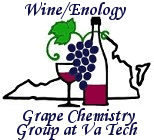 Enology Notes #31 October 12, 2001
Enology Notes #31 October 12, 2001
To: Virginia Vintners
From: Bruce Zoecklein
Subject: Juice and Wine Analysis Short Course
Enology-Grape Chemistry Group Lab Certification Program Results
The Enology-Grape Chemistry Group will offer a two-day juice and wine analysis short course January 8 and 9, 2002. This program will be a hands-on, practically-oriented laboratory course. It will be conducted in the teaching laboratory of the Food Science and Technology Building at Virginia Tech.
This program will include the following:
Registrants will participate in hands-on analysis. Analyses will be supplemented with discussions concerning the practical winemaking significance of each test.
Enrollment is Limited and Restricted. The short course will be limited to a total of 14 participants. Registration is for both days. Preference will be given to bonded winery representatives that register BEFORE DECEMBER 3, 2001.
After December 3, open enrollment will be offered if space is available.
Registration: Register by sending an email message to my secretary, Terry Rakestraw, at rakestra@vt.edu. If you are associated with a commercial winery, please indicate. Detailed information will be mailed to registrants prior to the short course.
Cost $300 per person. This includes the short course fee plus two lunches and an evening reception.
The complete registration fee is due NO LATER THAN December 10, 2001. Checks are to be written payable to Bruce Zoecklein, Foundation Account, Virginia Tech and mailed to
Bruce Zoecklein
Department of Food Science and Technology,
Virginia Tech (0418),
Blacksburg, VA 24061-0418
On the memo section of the check list "Gift."
Supplemental Text: It is suggested (but not required) that registrants have a copy of Wine Analysis and Production, Zoecklein et al. (1995) for this short course. If you have a copy, bring it to Blacksburg. Books will be available at the time of the program at the discounted rate of $80 each. Books will be available through my office to registrants only.
Results of Phase I of the Enology-Grape Chemistry Group Laboratory Certification Program
Phase I of the Laboratory Certification Program involved measurements of pH, titratable acidity (TA) and ethanol. Values for the specified measurements were determined experimentally in the Enology-Grape Chemistry Lab at Virginia Tech.
The pH values reported had a mean of 3.29 with a standard deviation of 0.04. 77% of the results were within 2% of the mean, which is considered acceptable. The balance had values which deviated significantly and may have been due to single point pH meter calibration or lack of recent calibration.
The correct value for TA in the sample was 4.1 g/L (as tartaric acid). Responding
wineries reported values for TA, ranging from 3.6 to 4.8 g/L. The mean and standard
deviation were 4.1 and 0.3 g/L. 54% of the results were within 0.1 g/L of the
actual value, and 77% were within 0.4 g/L. Ideally, all results should be within
0.1 g/L. Small variations for this analysis may be due to endpoint uncertainty
and incorrectly reading
the buret. The probable sources of larger deviation include difficulty in endpoint
determination, failure to use a pH meter to determine the endpoint, and failure
to standardize the NaOH solution. Large deviations require careful examination
of the experimental method.
The final test was determination of ethanol concentration. The value determined
in the Enology-Grape Chemistry Lab was 11.3 +/- 0.04 %, by ebulliometry. The
values reported ranged from 11.2 to 13.25%. Ignoring three obvious outliers
(11.8, 12, and 13.25%), the average value was 11.38%, with a standard deviation
of 0.15. This is excellent reproducibility. Errors in measurement by ebulliometry
can be due to
insufficient cooling of the condenser, allowing ethanol to boil off, or failure
to compensate for atmospheric pressure or pressure changes by measuring the
boiling point of distilled water. Ethanol can also be measured by distillation
and hydrometry. Hydrometry errors include dirty hydrometers, incorrect reading,
and failure to compensate for temperature. Overall, most of the wineries were
reasonably accurate on at least two of the analyses, but 70% had one deviation,
with the deviations evenly spread among the analyses. Only 23% of the wineries
were accurate on all three determinations. This demonstrates that there is still
some work to do on winery lab accuracy.
The results of the fermentable nitrogen certification have been reported to each winery and will be discussed in a subsequent email.
If you would like to have your name added or removed from our list serve for receiving future Enology Notes, please send a blank e-mail to bzoeckle@vt.edu with the word "Add" or "Remove" in the subject line.
Dr. Bruce Zoecklein
Associate Professor and Enology Specialist
Head, Enology-Grape Chemistry Group
Department of Food Science and Technology
Virginia Tech, Blacksburg VA 24061
Enology-Grape Chemistry Group Web address: www.fst.vt.edu/zoecklein/index.html
Phone: (540) 231-5325
Fax: (540) 231-9293
E-mail: bzoeckle@vt.edu